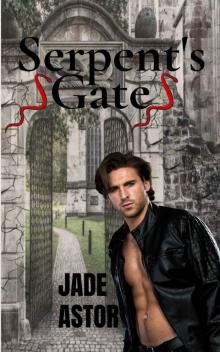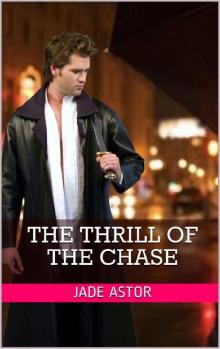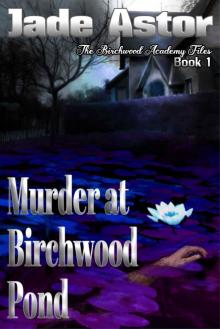- Home
- Jade Astor
Serpent's Gate
Serpent's Gate Read online
Serpent’s Gate
by
Jade Astor
Published by Jade Astor at Kindle Direct Publishing
Copyright 2019 Jade Astor
This ebook is licensed for your personal enjoyment only. This ebook may not be re-sold or given away to other people. If you would like to share this book with another person, please purchase an additional copy for each recipient. If you’re reading this book and did not purchase it, or it was not purchased for your use only, then please return to your favorite ebook retailer and purchase your own copy. Thank you for respecting the hard work of this author.
All characters and events in this book are fictitious. Any resemblance to actual persons, living or dead, is strictly coincidental.
Other titles by Jade Astor:
Snow Bite, Blood Red
Bachelor and the Beast
Pete and His Werewolf
The Werewolf Tutor
Night of the Satyr
Ebb Tide
The Baron’s Gargoyle
Artemis Gardens
Passionate Lessons
Passion Unmasked
Kiss of the Dark Prince
The House on the Cliff
Chapter 1
Vibrant blue water filled the screen, so clear and warm Stephen could practically feel himself floating in it. Clouds as fleecy and white as pillow stuffing drifted through a perfect turquoise sky.
In the foreground, his three friends stood by the ship’s rail, shirtless and smiling as the tropical wind ruffled their hair.
A brief text accompanied the photo.
Weather hot but lovely. Food is amazing. All of us have gained five pounds at least. What’s stuffed inside those tiny swimsuits is even finer. Hope Uncle Vernon feels better.
Stephen flicked off his phone with a grimace. Every one of his college friends, it seemed, was off doing something fun except him. Three were on an all-male cruise to celebrate their graduation, others were starting exciting new careers in Boston, Chicago, and even London, and one had even landed a role in a television commercial. Meanwhile, Stephen was minding the front desk at his Uncle Vernon's used—or antiquarian, as he insisted they call it—bookstore. Despite the cultured terminology, the place felt dingy, cramped, and always dusty, no matter how much he wiped the shelves and vacuumed the floor. It had taken his uncle decades, and his family nearly two centuries, to amass their vast inventory. The volumes ranged in age from fifty to a hundred and seventy years old. They were bound in covers made of cardboard, fabric, vellum, and leather. Some of the pages, though brittle and discolored from age, were edged with gold, silver, or red. Those pages contained poetry, biographies, novels, and nonfiction on every conceivable subject (though Stephen figured a few of those contained at least some fiction). Their values ranged from a few pennies to hundreds of dollars. Uncle Vernon kept three or four others in a special temperature-controlled safe in his office, claiming he could eventually sell them for even more, providing the right buyer presented himself. The store and its dilapidated contents were his uncle’s whole life. Unfortunately, this summer they had taken over Stephen’s life, too.
Even now, Uncle Vernon was fussing over the faded Victorian prints that hung above the old-fashioned cash register.
How much lousier could this summer get?
“Stephen, I hope you can find a few minutes this afternoon to take out the stepladder and brush off our pictures. The glass is looking rather murky.”
“Do I have to do it today?” Stephen rolled his eyes in secret. After his heart attack, mild though it had been, Uncle Vernon needed help both at the store and at his tiny, antique-filled house. So far, he'd been happy for the company, though Stephen knew that would change when his uncle discovered the other reason he was here. Thankfully, that moment was still a long way off. At least, Stephen hoped so. “I wanted to spend a couple of hours on the computer—you know, putting more books online.”
Uncle Vernon pursed his lips in disapproval. “You can swim the Internet later, Stephen. Making sure the store sparkles for customers must be our first priority.”
“You mean surf the Internet. And what customers are you talking about? No one’s been in here for days, except Geoffrey. And he doesn’t care about dust.”
“Whatever it’s called, you knew exactly what I meant. And as far as customers are concerned, one might stroll in at any moment. So you might as well get busy now. I’m going to take yesterday’s orders to the post office. The line always starts to grow after noon.”
Stephen’s irritation shifted to concern. “Are you sure that’s wise?”
“Young man, I suffered a heart attack, not two broken legs. And it was a mild one on top of that. I shall be perfectly fine strolling three blocks with four light packages in my hands. Even the doctors told me I should indulge in light exercise. The sunshine and fresh air will do me good.”
Considering the dust and gloom inside the shop, not to mention the acidic smell of old, deteriorating books, Stephen was inclined to agree with Uncle Vernon. Before he could answer, the shop door opened and Geoffrey Benton, their steadiest and most devoted customer, entered. Today Geoffrey had put on a brown pinstriped suit, probably left over from his days as a college history professor, along with a light blue shirt and a sporty pink bow tie. The outfit was far too formal for the shop, not to mention too hot for a brilliant June afternoon, but of course it wasn’t the store itself that Geoffrey was devoted to.
“Good morning, Geoffrey,” Vernon said without any particular enthusiasm, which instantly deflated Geoffrey’s mood. He made a visible effort to rally. “Lovely to see you, but I was just on my way to the post office. Why don’t I bring us back some luncheon? Sandwiches, perhaps, on French baguettes? Possibly something with pesto.”
“Why doesn’t Geoffrey go with you?” Stephen suggested. “He could help carry the parcels. After all, you wouldn't want to drop anything and damage either the books or the food.”
“Excellent idea,” Vernon boomed, causing Geoffrey to flash Stephen a silent expression of thanks. “I’ll just go and gather up the packages, shall I? I trust you printed out the labels this morning.”
“Yes, Uncle Vernon. The orders are right on your desk, taped up and ready to go.”
“Don’t worry,” Stephen reassured Geoffrey as Vernon disappeared into his office at the back of the store. “He’ll come around. Give it some time.”
“Will he? The man is maddeningly oblivious. This isn’t easy for me, you know. I’m not naturally outgoing. And as far as giving him more time, your uncle and I are old men, as I’m sure you’ve noticed. Time is running out for both of us.”
Stephen sighed. Doling out romantic advice to lovelorn geriatrics was just another indication of how thoroughly his summer had gone down the tubes. “I can talk to him if you want. Nudge him in the right direction.”
Geoffrey took a horrified step backward. “No! Never! I would die of embarrassment, and I could certainly never set foot in this shop again. Please, Stephen, promise me you’ll do no such thing.”
“Okay. I promise.” That vow, at least, was easily made. Aside from any other considerations, he didn’t want to risk Uncle Vernon losing his one steady customer. Besides, Geoffrey would be an ideal ally when the time came to broach a certain sensitive subject.
His uncle soon returned with several square packages in his arms. Geoffrey dutifully fell into step behind him.
“Back in a jiffy,” Vernon called cheerily over his shoulder as he swept out of the store with Geoffrey close on his heels. “Don’t forget the picture frames.”
“I’ll get right on it.” Relieved to be alone for a while, but figuring it would be easier to tidy the shop without Uncle Vernon critiquing his every move, Stephen went to the closet an
d pulled out the rickety stepladder. Uncle Vernon meant well, he reminded himself as he positioned it under a row of dingy oval frames. His uncle just couldn’t fathom anyone not being as into those smelly, mildew-stained old books and prints as he was. Still, even he must have noticed that their only visitors were a few elderly collectors, retired academic types like Geoffrey, and the occasional misdirected tourist. Almost none of them ever bought anything, though they had no problem scattering the merchandise around for Stephen to pick up and put back, assuming they hadn’t damaged it in the process. At least Geoffrey treated everything with care, mostly because he was too busy mooning over Uncle Vernon to turn the brittle pages of the books he pretended to study.
Clutching a bottle of watered-down cleaning solution in one hand and a rag in the other, Stephen clambered up the wooden rungs. Balancing carefully, he squirted at the powdery layer of grime and bit back a sneeze as a cloud of dust and cobwebs blew into his face. Okay, so maybe Uncle Vernon was right about this part of the store. Probably no one had tidied the two pictures up since they’d originally been hung in 18-whatever.
Chemical smells assaulted his senses as he swiped his rag over the antique glass. In the end, he succeeded mostly in smearing all the dirt over to one side. Hoping Uncle Vernon’s sixty-eight-year-old eyes wouldn’t be sharp enough to notice, Stephen balled up the rag and clambered back down the ladder. When he turned to set the spray bottle on the counter, someone entered the store.
This customer, unlike any of the others he had seen so far, wasn’t some doddering old professor or pretentious collector. A tourist, most likely. He seemed to be dressed for a casual, though decidedly upscale, outing—bright gold polo shirt, the collar upturned jauntily, neatly pressed tan khakis, and brown loafers without a single scuff. All that was missing was a pair of designer sunglasses perched on top of his artfully tousled dark hair.
“Uh…hi.” Stephen tossed the crumpled-up rag on the chair behind the counter. “Welcome to Carlyle Books.”
Saying nothing, the newcomer scanned the walls and shelves with a curious air. Stephen pegged him as probably only a couple of years older than he was, 25 at most. No way was anyone that age—or that cute—interested in Uncle Vernon’s inventory. Maybe he’d come in to ask for directions.
“Are you lost?” Stephen asked.
The customer’s brown eyes narrowed slightly. “How could I be lost? Didn’t you just tell me the name of the store?”
Okay, so maybe he was a little pretentious after all.
“I guess I did. I thought you might be looking for the brick museum. A lot of people ask about it.”
“I know where that is.”
“All right, then. Just asking.”
“Would it surprise you to hear that I came to browse through old books?”
Stephen shrugged. “Not really. I mean, we are a bookstore. An antiquarian bookstore, my uncle always reminds me. He’s pretty particular about that term.”
“I don’t blame him.” His customer turned in a slow circle, as if appraising the store’s fixtures and atmosphere as well as its contents. His shrewd gaze moved from the floor-to-ceiling shelves of books to the framed nineteenth-century prints Stephen had just been sneezing over. His attention settled on the open laptop on the desk.
“The computer seems a little out of place in here. If not for that and the wall sockets, I might have believed I’d stepped through some kind of portal into a time before electricity and wireless access.”
“Oh, we have both of those things.” Stephen couldn’t tell if he was being friendly or condescending. “In fact, almost a quarter of our books are online now.”
“Thanks to you, I assume.” The guy glanced at the laptop again, and Stephen nodded. “You haven’t worked here long, then. Otherwise they would all be online by now.”
“I’m just here for the summer. My uncle is the owner.” He started to brag that Uncle Vernon had gone to the post office to send out a few of their many lucrative Internet orders, but quickly thought better of it. Granted, this guy didn’t look like he’d come to rob the place, but you never knew nowadays. His uncle had stressed caution to him over and over. First rule of retail, he often said. Never say more than you have to and never leave the till unguarded. Not that there was anything in it right now.
“You’re a Carlyle, then.” That sharp gaze darted above Stephen’s head to the picture on the wall, depicting a white-haired gentleman in the stiff, high collar that probably caused his cranky expression. “Is that your ancestor?”
“Yes. Maynard Carlyle, the founder of Carlyle Books,” Stephen said with a touch of pride. “One of my grandfathers, though I forget exactly how many greats. This store has been here a long time.”
“The current owner is Maynard the third, then? Or fourth?”
“Actually, none of the above. His name is Vernon.”
“Pity. Seems you’d want to keep the name going along with the business.”
“Maynard’s a little old-fashioned for the twenty-first century.” He chanced a smile. “I’m Stephen, by the way.”
“Family heritage is so important, don’t you think? It would be nice if you stayed in business for another hundred years. With you at the helm someday, perhaps.”
“I guess so.” Secretly horrified at the thought, Stephen glanced down at his laptop and chewed his lower lip. The customer laughed, and Stephen wondered if he was genuinely amused or just making fun of him.
“Anyhow, I didn’t mean to distract you from your work, Stephen. I’ll just poke around, if that’s okay.”
“Sure. Go ahead.” Stephen returned to his computer and picked up the first of a dozen books he’d set aside to list for sale online. Discreetly, he watched the young man wander between and around the many overstuffed shelves. Their store didn’t attract shoplifters as far as he knew, but his uncle had assured him that rare book thieves did exist, and some first editions were worth hundreds of dollars—assuming anyone wanted to buy them, which Stephen frankly found hard to believe. Keeping an eye on him wasn’t exactly a chore. In a different setting, Stephen might have felt up to chatting—or maybe even flirting, given a little encouragement. But at the moment, the guy actually seemed interested in Uncle Vernon’s old books. Go figure.
Eventually, he emerged from between the shelves with a small red book in his hands. Stroking his fingers over the gilt-edged pages, he flipped it open and began to read in a strong, clear tone, as though he had been asked to present in English class.
“The lady strange made answer meet,” he recited. “And her voice was faint and sweet. Have pity on my sore distress, I scarce can speak for weariness. Stretch for thy hand, and have no fear.” Finishing, he raised his head. “It’s Coleridge. ‘Christabel.’”
“A favorite of yours?” Uncle Vernon had taught him to act interested even in the dullest subjects the customers wanted to read about. That attitude helped sell books, at least in theory.
“This poem fascinates me,” he said. “The Lady Geraldine clearly infiltrated Sir Leoline’s castle for malevolent purposes. When she changes into her nightgown, Christabel sees something shocking. One interpretation is that her skin is scaly, like a serpent’s. In another scene, she’s described as fixing snakelike eyes on Christabel and her father. And then there’s the dove Bard Bracy saw about to be devoured by a snake in the garden. All symbolic.”
“Sounds like it,” Stephen agreed.
“Legend has it that when Lord Byron read it aloud at a party, his fellow poet, Shelley, ran from the room screaming.”
“Over a poem?” Maybe he was screaming in boredom, Stephen thought, though he didn’t dare to say it out loud.
“Yes. Unfortunately, Coleridge left it unfinished. I sometimes think it might have been because the ending he envisioned was so terrible, so horrifying, that he couldn’t bring himself to write it down. Just imagining it freaked him out.” He gave Stephen a wry smile. “Cynics prefer to say that Coleridge’s substance abuse problems likely played the big
gest role.”
Or just plain procrastination. Stephen himself had plenty of experience with that. “Anything’s possible,” he conceded.
“Then again, he never finished ‘Kubla Khan’ either. In that case, he claimed a visitor arrived from Porlock and broke his concentration. Nothing too scary about that.”
“If he was telling the truth. Maybe it was just an excuse because he couldn’t think of a good ending. The same might go for ‘Christabel.”’
“Maybe so. It could depend who the visitor was, too. You know—maybe he was one of those people who come barging in and make it impossible to do your work.” He traced his finger along the spine of the book. Then he carried it over to the desk and held it out. “I’ll take it.”
Stephen flipped over the cover to check the price Uncle Vernon had penciled in, but his strange customer had already taken out his wallet and handed him a twenty-dollar bill. His gaze turned so intense it unnerved Stephen a little.
“Tell me something,” he demanded. “What would you do if you ever came across a book that was evil?”
“Evil?” Stephen blinked at him. “What’s that supposed to mean?”
“Could you resist it? Would you fight it? Or would you let it slowly take you over…like Christabel did with Geraldine in the poem?”
“Books can’t be evil. They’re just paper and glue, mostly. Anyway, you said the poem has no ending. So we don’t know what Christabel did.”
“Forget the poem. I’m asking what you would do.”
The guy’s intense stare began to annoy him. Trying to freak him out, obviously. Maybe he wasn’t so different from Uncle Vernon’s other customers, after all.
“First, I’d look the title and publication date up on the Internet.” Stephen pointed to his computer. “Then I’d price it and put it on the shelf. Just like I do with all the rest.”
Those dark eyes frosted over. He placed the twenty on the counter.
“Keep the change,” he said. “Consider it a tip for indulging my Porlockian patter. Good day, Stephen.”

 Serpent's Gate
Serpent's Gate The Thrill of the Chase
The Thrill of the Chase Return to Warlock's Cove
Return to Warlock's Cove Ebb Tide
Ebb Tide Murder among the Palms
Murder among the Palms Single Vampire Seeks Consort
Single Vampire Seeks Consort Murder at Birchwood Pond
Murder at Birchwood Pond Murder in the Shadows
Murder in the Shadows![Lyrion's Gift [Elven Conceptions 1] (Siren Publishing Ménage Amour ManLove) Read online](http://i1.bookreadfree.com/i1/04/02/lyrions_gift_elven_conceptions_1_siren_publishing_menage_amour_manlove_preview.jpg) Lyrion's Gift [Elven Conceptions 1] (Siren Publishing Ménage Amour ManLove)
Lyrion's Gift [Elven Conceptions 1] (Siren Publishing Ménage Amour ManLove) morgan
morgan